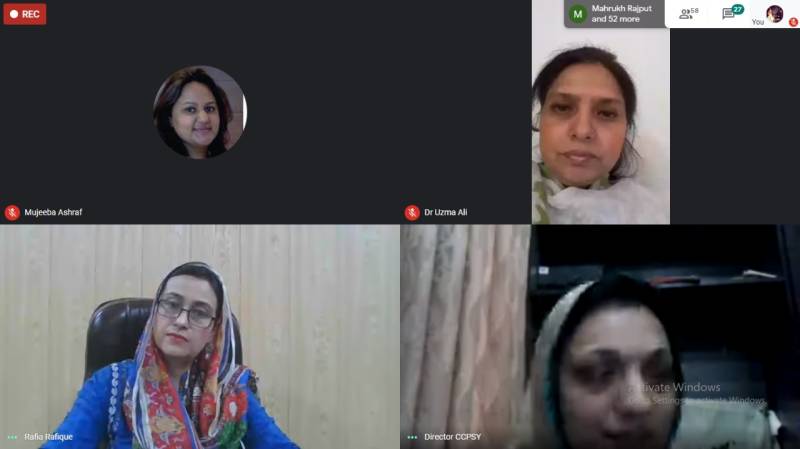PU organizes first virtual conference on mental health

Stay tuned with 24 News HD Android App

Punjab University Institute of Applied Psychology on Tuesday arranged a virtual conference on designing protocols for mental health helpline volunteers amid coronavirus.
Speakers expressed concern on growing mental health issues and enlightened the conference participants with their expert opinions.
It was emphasized that individuals with prior mental and physical health issues are more likely to get affected amid lockdowns and physical distancing. The role of spirituality, religious coping and gratitude was emphasized.
They gave guidelines regarding how to objectively address issues such as anxiety, depression, educational concerns etc.
Dr Afsheen Masood, Professor Dr Najma Najam, Dr Naumana Amjad, Dr Fatima Kamran, Dr Mujeeba Ashraf, Dr Saima Ghazal and Dr Afifa Anjum highlighted different psychological issues associated with the current pandemic.
Faculty of Life Sciences Dean Professor Dr. Firdous-e-Bareen chaired the conference. IAP Director Dr Rafia Rafique welcomed more than 60 psychologists across Pakistan in the virtual conference.
Conference speakers including Dr Mohsina Najeeb, Dr Tanveer Nasar, Prof. Dr Uzma Ali, Dr Irum Zehra Bokhari, Dr Lubna Azhar and Dr Saima Dawood gave deliberations regarding designing a need-based criterion and guidelines for volunteers of COVID-19 Mental Health Helpline of Institute of Applied Psychology.
World Health Organization (WHO) in its guideline for mental health considerations amid COVID-19 urged people to be empathetic to all those who are affected, in and from any country. People who are affected by COVID-19 have not done anything wrong, and they deserve our support, compassion and kindness.
“Do not refer to people with the disease as “COVID-19 cases”, “victims” “COVID-19 families” or “the diseased”. They are “people who have COVID-19”, “people who are being treated for COVID-19”, or “people who are recovering from COVID-19”, and after recovering from COVID-19 their life will go on with their jobs, families and loved ones. It is important to separate a person from having an identity defined by COVID-19, in order to reduce stigma.”
WHO guidelines for health workers said “Take care of yourself at this time and try and use helpful coping strategies such as ensuring sufficient rest and respite during work or between shifts, eat sufficient and healthy food, engage in physical activity, and stay in contact with family and friends and avoid using unhelpful coping strategies such as use of tobacco, alcohol or other drugs.
“In the long term, these can worsen your mental and physical well-being. The COVID-19 outbreak is a unique and unprecedented scenario for many workers, particularly if they have not been involved in similar responses. Even so, using strategies that have worked for you in the past to manage times of stress can benefit you now. You are the person most likely to know how you can de-stress and you should not be hesitant in keeping yourself psychologically well. This is not a sprint; it’s a marathon,” WHO said.
WHO complete guidelines can be downloadable from this link
https://www.who.int/docs/default-source/coronaviruse/mental-health-considerations.pdf
